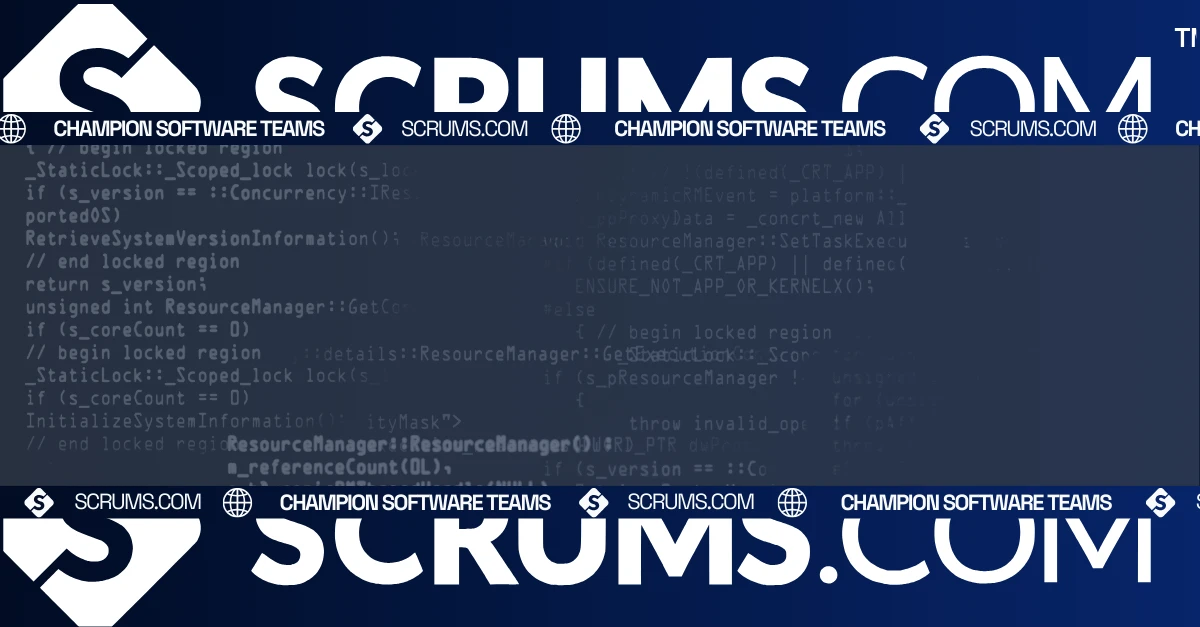Hire .NET Core software developers
Scrums.com's 8,500+ software developer talent pool includes experts across a wide array of software development languages and technologies giving your business the ability to hire in as little as 21-days.
Trusted by 400+ global companies
















What is .NET Core and Why It Matters for Your Business
.NET Core is a powerful, open-source framework developed by Microsoft, designed to build modern, scalable, and high-performance applications across various platforms. According to Stack Overflow's 2023 Developer Survey, .NET Core remains one of the most loved and widely used frameworks among developers, particularly in enterprise environments. Whether you’re developing enterprise-level software or building web applications, .NET Core provides the flexibility and efficiency needed to create robust solutions. Its cross-platform capabilities mean that applications can run on Windows, macOS, and Linux, making it an ideal choice for businesses looking to reach a broad audience with minimal overhead.
In today’s competitive market, leveraging .NET Core can significantly enhance your digital infrastructure, providing the scalability and performance needed to meet the growing demands of your business. This framework's versatility makes it a popular choice among enterprises, driving the need to hire skilled .NET Core software developers who can bring your projects to life.
Key Benefits of Hiring a .NET Core Developer for Your Projects
Hiring a .NET Core software developer offers numerous advantages, especially for businesses aiming to stay ahead of the curve. Here are some key benefits:
- Scalability: .NET Core is designed to handle high-traffic applications, making it perfect for businesses that anticipate growth. A skilled .NET Core developer can build scalable solutions that grow with your business needs.
- Performance: Known for its speed and efficiency, .NET Core enables developers to create high-performance applications that run seamlessly across multiple platforms. Studies show that .NET Core can handle up to 8 million requests per second, significantly outperforming many other frameworks.
- Security: .NET Core includes advanced security features, such as built-in authentication and data protection, ensuring that your applications are secure from common threats. In a 2022 report by Cybersecurity Ventures, the cost of cybercrime is expected to reach $10.5 trillion annually by 2025, highlighting the importance of security in application development.
- Cost-Effectiveness: As an open-source framework, .NET Core reduces licensing costs, allowing businesses to allocate resources more effectively. A proficient .NET Core developer can maximize these benefits, delivering high-quality solutions within budget.
Core Competencies of a Skilled .NET Core Developer
When hiring a .NET Core software developer, it’s essential to look for specific competencies that ensure they can deliver on your business needs. Key skills include:
- Proficiency in C#: .NET Core developers should be highly proficient in C#, the primary language used within the framework. According to the TIOBE Index, C# consistently ranks among the top 5 most popular programming languages globally.
- Experience with ASP.NET Core: ASP.NET Core is a crucial component of .NET Core for building web applications. Developers should have hands-on experience in creating scalable, secure, and high-performance web apps using this framework.
- Knowledge of Cloud Integration: With the increasing move towards cloud computing, a .NET Core developer should be familiar with integrating cloud services like Microsoft Azure, AWS, or Google Cloud into applications. Gartner predicts that by 2025, over 85% of enterprises will have a cloud-first principle, emphasizing the importance of cloud expertise.
- Database Management: Understanding how to work with databases like SQL Server, MySQL, or PostgreSQL is critical. A .NET Core developer should be skilled in database design, management, and optimization.
- Version Control and CI/CD Pipelines: Proficiency in version control systems like Git and experience with continuous integration/continuous deployment (CI/CD) pipelines ensure that the development process is streamlined and efficient.
How .NET Core is Used in Modern Web Development
.NET Core is a versatile framework used extensively in modern web development. It is particularly well-suited for building:
- Enterprise Applications: Large-scale enterprise solutions that require high performance, security, and scalability are often built using .NET Core. This includes ERP systems, CRM platforms, and more. The enterprise software market is projected to reach $650 billion by 2026, underscoring the demand for robust enterprise solutions.
- Cross-Platform Applications: With its cross-platform capabilities, .NET Core allows developers to create applications that run smoothly on different operating systems, making it ideal for businesses with diverse tech stacks.
- Web APIs: .NET Core is a popular choice for building RESTful APIs, enabling seamless communication between different software systems and supporting microservices architecture. Microservices adoption is expected to grow by 21% annually, making .NET Core’s capabilities in this area highly relevant.
- Cloud-Based Solutions: As businesses move towards cloud-native applications, .NET Core’s integration with cloud platforms like Azure makes it a top choice for developing cloud-based services and applications.
.NET Core vs. Other Frameworks: When to Choose .NET Core for Your Project
When deciding between .NET Core and other development frameworks, it’s essential to consider your specific project needs:
- Cross-Platform Needs: If your project requires a solution that runs across multiple operating systems, .NET Core’s cross-platform capabilities make it a superior choice over frameworks like .NET Framework, which is Windows-only.
- Performance Requirements: For projects that demand high performance and low latency, .NET Core outshines many other frameworks due to its optimized runtime and ability to handle asynchronous programming efficiently.
- Security Concerns: In environments where security is paramount, .NET Core’s built-in security features provide a robust defense against common vulnerabilities, making it preferable over other frameworks with less comprehensive security features.
- Open-Source Advantage: Unlike older versions of .NET, .NET Core is open-source, allowing for greater flexibility and community support. This makes it an attractive option for businesses looking for cost-effective yet powerful development solutions.
The Future of .NET Core Development: Trends and Insights
The future of .NET Core is bright, with several trends shaping its evolution:
- Microservices Architecture: .NET Core is becoming increasingly popular for developing microservices, thanks to its lightweight nature and support for containerization technologies like Docker. According to a report by O'Reilly, 92% of organizations are adopting microservices or planning to in the near future.
- Blazor: The introduction of Blazor, a framework for building interactive web UIs using C# instead of JavaScript, is expanding the possibilities of what .NET Core can achieve in the web development space.
- AI and Machine Learning Integration: With the growing importance of AI and machine learning, .NET Core’s integration with ML.NET, Microsoft’s machine learning framework, is opening new avenues for building intelligent applications.
- Cloud-Native Development: As cloud adoption continues to rise, .NET Core’s deep integration with Azure and other cloud platforms will play a significant role in the future of cloud-native application development. IDC predicts that by 2025, 80% of organizations will shift their application development to cloud-native models.
How to Hire the Right .NET Core Developer for Your Needs
Finding the right .NET Core software developer involves understanding your project requirements and identifying candidates with the relevant experience and skills. Here’s how to get started:
- Define Your Project Scope: Clearly outline the scope of your project, including technical requirements, timelines, and deliverables. This will help you find a developer whose skills align with your needs.
- Evaluate Technical Expertise: Look for developers with a proven track record in .NET Core development, particularly in areas relevant to your project, such as ASP.NET Core, cloud integration, or database management.
- Check for Problem-Solving Skills: Beyond technical proficiency, ensure the developer has strong problem-solving abilities. This is crucial for overcoming challenges that arise during development.
- Assess Communication Skills: Effective communication is key to successful project execution. Choose a developer who can clearly articulate ideas, provide regular updates, and collaborate effectively with your team.
- Consider Hiring Through a Trusted Platform: Partnering with a trusted platform like Scrums.com can streamline the hiring process, giving you access to pre-vetted .NET Core developers who are ready to hit the ground running.
Don't Just Take Our Word for It
Hear from some of our amazing customers who are building with Scrums.com Teams.
Find Related Software Developer Technologies
C++ developers
Javascript developers
Python developers
React Native developers
Zikula developers
How to Hire Software Developers with Scrums.com
Align
Let us get to know your business. Book a free consultation and tell us about your tech talent requirements.
Review
Our teams will look at the current culture and requirements of your business and match quality tech talent that best suite your teams.
Meet
Meet your tech talent. We have a 33% acceptance rate as we pre-qualify suitable talent to ensure they meet your needs.
Kick-Off
Once we have agreed on the best way forward, we will start the contract closure process. Once that's done - We can kick-off!
Explore Software Development Blogs
The most recent trends and insights to expand your software development knowledge.










